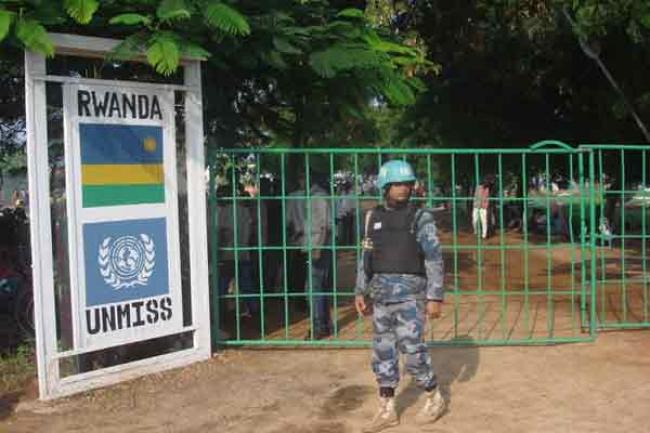Just Earth News 13 Jul 2016, 05:16 pm Print

Beatrice Mategwa
According to a UN spokesperson, UNMISS on Wednesday welcomed the ceasefire announced [by President Salva Kiir and endorsed by First Vice President Riek Machar] yesterday, and Mission chief Ellen Margrethe Løj, strongly urged all parties to adhere to the ceasefire and called on South Sudanese leaders to ensure the order is conveyed through all security forces’ chains of command so that soldiers return to their barracks.
The ceasefire comes after days of clashes between soldiers of the Sudan People’s Liberation Army (SPLA) and the SPLA in Opposition, in an around the South Sudanese capital of Juba. The UN human rights office has said that since Thursday, 7 July, according to Government figures, at least 272 people had been killed, including 33 civilians.
UN Spokesperson Stéphane Dujarric told reporters at UN Headquarters this afternoon that Løj has urged security forces in Juba to allow unhindered access to UNMISS patrols to protect the civilian population and called on the parties to allow civilians to move freely to places of refuge.
“She urged the Government to open up corridors to allow UN and humanitarian actors to provide vital supplies and other assistance to the affected civilians, as well as access for medical evacuations,” Dujarric added.
UNMISS also reported that the airport in the capital has been reopened, although commercial flights remain suspended. Peacekeepers were able to conduct a limited number of short patrols in Juba on Wednesday.
Liberation Army (SPLA) and the SPLA in Opposition (SPLA-IO). UN Photo/Beatrice Mategwa
Since the fighting began on Friday, some 5,000 additional internally displaced persons (IDPs) have sought protection in the UN's Tomping compound in the capital. Another 3,000 IDPs who arrived at the UN House premise have been relocated to the protection of civilians’ site nearby, the Spokesperson explained, referring to the situation at some of the protection of civilians (PoC) sites UMISS has been operating since the political face-off between President Kiir and Machar erupted into full-blown conflict in 2013.
Human rights situation ‘deteriorating rapidly’ UN warns
Meanwhile at the regular press briefing in Geneva, spokesperson Cécile Pouilly of the Office of the UN High Commissioner for Human Rights (OHCHR) told reporters: “We are extremely concerned at the rapid deterioration of the security and human rights situation in South Sudan.”
Preliminary estimates indicated that at least 36,000 people had been displaced by the fighting and were seeking shelter in the UNMISS civilian protection sites and many other locations across the city. Most of the affected people were women and children.
Pouilly noted that OHCHR is also deeply concerned at reports of civilians being prevented from seeking refuge in the premises of the UNMISS and, in some cases, being shot at while trying to do so, as well as reports that UN compounds and PoC sites have been directly caught in the fighting and apparently at times directly targeted.
She said that there are indications the violence has started to spread to other parts of the country. Armed clashes reportedly erupted yesterday in Mundri, Lainya, Kajo-Keji and Yei, in Central Equatoria state, as well as in Torit, in Eastern Equatoria state.
Welcoming the ceasefire declared by the leaders of the two sides, OHCHR called on both leaders to exercise their leadership and make a concerted and genuine effort to stop their respective forces from fighting each other, as well as to do their utmost to ensure the protection of the civilian population.
UN refugee agency calls for safe passage for people fleeing Juba
The UN refugee agency is calling on all armed parties to ensure safe passage for people fleeing the fighting in Juba, urging neighbouring countries to keep borders open to people seeking asylum.
“Emergency preparedness is in progress in Kenya, Sudan and other neighbouring countries in case of a major influx,” said Spokesperson Leo Dobbs of the Office of the UN High Commissioner for Refugees (UNHCR).
Some borders have been affected, such as the Uganda-South Sudan crossing, where security is tightened on the South Sudan side, he said. This has led to a significant decrease in the number of new arrivals coming into Uganda over the weekend.
He said that just 95 people crossed on Saturday, dropping to 36 on Sunday, compared with a daily average of 167 for July and 171 for June.
Also at the briefing, Tarik Jašarevic, for the World Health Organization (WHO), said the movement of WHO staff in Juba was being restricted by military forces. Mothers carrying children had been seen fleeing and trying to reach protection of civilians compounds.
Several days earlier, the WHO had managed to supply the Juba Teaching Hospital with essential medicine and body bags. Medical kits would be distributed to partners on protection of civilians sites, and the WHO was mobilizing additional human and financial resources.
Out of the $7.5 million which the WHO needs for health interventions in South Sudan, only $4.3 million had been received thus far. The health cluster as a whole was only 28 per cent funded, stated Jašarevic.
- Pakistan: Police recover two bullet-ridden bodies from Balochistan
- IDF strikes Hezbollah targets in Lebanon after projectile fire toward Northern Israel; 31 killed
- Pakistan: Armed gunmen kidnap 14 workers during coordinated raids in Balochistan
- ISIS-inspired plot foiled in UK: Two men get life sentences for targeting Jewish community
- India rejects allegations, urges Pakistan to tackle its ‘home-grown ills’





-1763561110.jpg)
